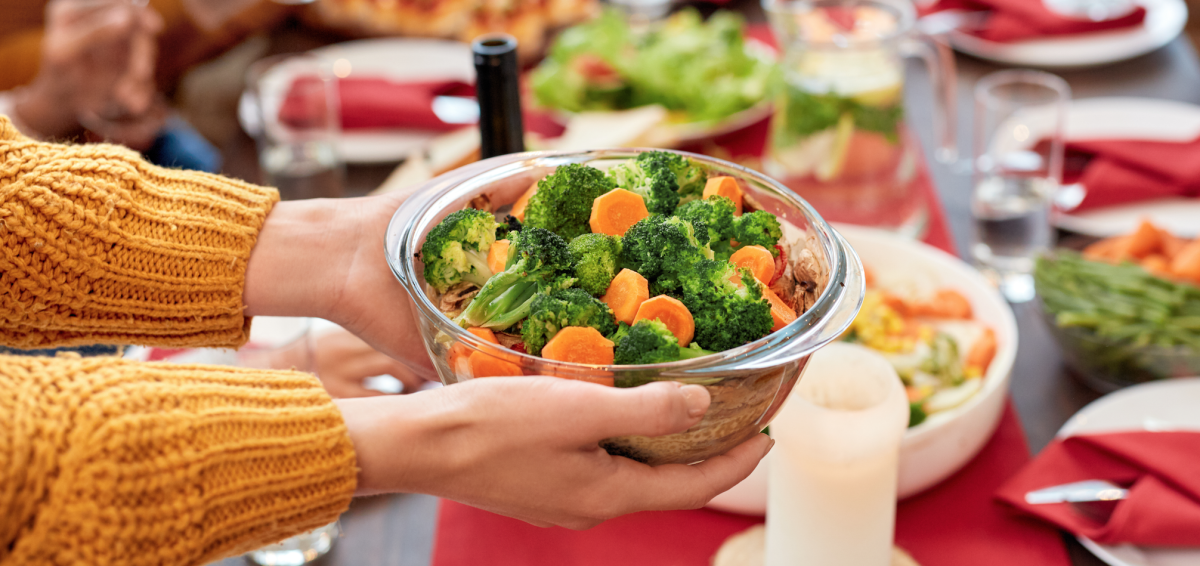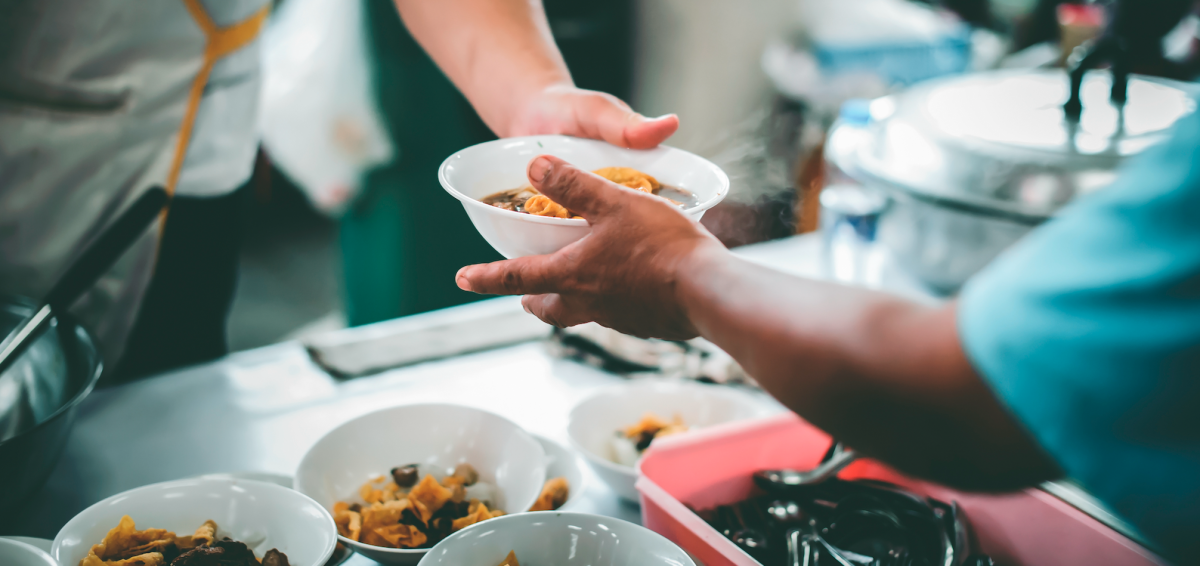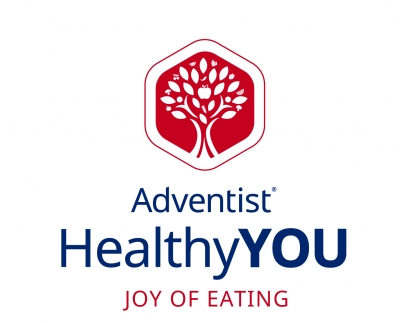Celebrating a Plant-full Holiday Season
Contributed by Maggie Collins, MPH, RDN, CDCES, DipACLM
The holiday season is upon us and with that comes all the special dishes we reserve (or try to) for this time of the year. But how does our body respond to these occasional splurges? Are there plant-based solutions to minimize the extra calories, sugar, fat, and sodium that so easily pile up during the holidays? Does the Bible have anything to say about foods for special occasions? You don’t want to miss our upcoming article discussing these interesting questions.
How does our body respond to an occasional splurge?
The best answer is it depends.
- It depends on how healthy is your overall lifestyle. If you really eat healthy most of the time and are physically active, it is likely your body can recover from an occasional overindulgence.
- It depends on your physical activity on that day. If more calories are being consumed, but that is compensated with increased physical activity the impact of an unusual heavy meal may not be as bad.
- It depends on the eating habits on the rest of that day. If you know you will be exposed to richer food and more food in general, and you adjust the calories consumed the rest of the day, the overall impact of that meal may not be as bad either.
- It depends on what you are drinking during that meal. If you stick to drinking plain water or unsweetened tea, you may be able to significantly limit the total extra calories, as opposed to sugary or alcoholic beverages.
- It depends on how much water you drink before big meals. One study found that a group of middle-aged and older adults drinking 2 cups (~ 16oz) of water 30 minutes before each meal end up consuming less calories, which over time led to 44% greater weight loss compared to individuals only restricting calories [1].
- Probably the most important aspect to consider is your current health status. Individuals with a history of heart disease or with risk factors such as obesity, diabetes, smoking, or high blood pressure should be extra careful. A study that investigated what a group of almost 2,000 individuals ate in the 26-hour period preceding their heart attacks concluded that an unusually heavy meal may increase the risk of heart attack by about four times within two hours after eating [2]. According to the investigators on this study, there are several ways a heavy meal can negatively affect the heart:
- The excess fat and insulin after a large meal affect the endothelium (the inner lining of the arteries) causing them to harden;
- The process of digestion releases hormones into the bloodstream that temporarily increase the heart rate, blood pressure, and substances that help form clots.
- The increase in blood pressure increases the burden on the heart and may also cause cholesterol plaques in the arterial walls to rupture, which can trigger a blood clot to form. If the blood clot blocks that blood vessel, that can in turn trigger a heart attack or a stroke.

Plant-based Solutions to Minimize the Extra Calories, Sugar, Fat, and Sodium on Special Meals
- Swap mashed cauliflower for mashed potatoes. Cauliflower is about four times less caloric dense than potatoes.
- Aim to fill half of your plate with non-starchy vegetables. That helps to displace space in your stomach that would otherwise be occupied by more caloric foods.
- Eat a piece of fruit 15 minutes before the meal. A study found that individuals that ate an apple before a meal ended up eating 15% less calories at that meal [3]. Other studies have found similar results when consuming oranges and grapes in terms of reducing hunger levels[4], so it is likely this property would also apply to any whole fruit.
- Look for desserts that are entirely or at least partially sweetened with dried fruit instead of sugar, or other concentrated sweeteners that lack dietary fiber (such as maple syrup, molasses, or agave nectar).
- Look for ways to increase the fiber in your dishes, by favoring whole grains instead of refined grains, and vegetable-based dishes. Examples are: stuffing made with whole wheat bread, a side dish made with quinoa or brown rice, and green beans casserole.
- Look for ways to minimize the saturated fat, by replacing butter with olive oil or vegetable broth when sautéing, and replacing heavy cream with raw cashews blended with water.
- Minimize the variety of dishes. Studies consistently show that the increased meal variety is associated with increased food consumption [5-7].
Other Tips for a Healthy Holiday Season
- Create fun family traditions that are not centered around food.
- Keep your physical activity steady. The general recommendation for good health is at least 150 minutes of aerobic activities, distributed throughout the week in a way to prevent periods longer than 48 hours without physical activity.
- If you end up overdoing your food intake in some occasions, don’t use it as an excuse to blow the rest of the season. Get back on track with healthy food choices.

Does the Bible have anything to say about Foods for Special Occasions?
The Bible relates instances of foods and non-alcoholic beverages being part of special occasions in ways that were approved by God:
- When entertaining guests; (Genesis 18:1-8; 19:1-3);
- To celebrate an extraordinary event, such as when the prodigal son returned home (Luke 15:22-32);
- To celebrate special events, such as a wedding (John 2:1-10).
However, we also have examples of foods in celebrations held by the heathen and those occasions seemed to be followed by some type of tragedy:
- John the Baptist was decapitated during king Herod’s birthday feast (Mark 6:21-28);
- The Great Babylonian empire collapsed during Belshazzar’s feast (Daniel 5);
- Queen Vashti was dethroned on the seventh day of king Ahasuerus feast (Esther 1); a decision made while the king was intoxicated (Esther 1:10).
- The inhabitants of Sodom and Gomorrah committed terrible sins, leading to the judgment of God, and the Bible lists excess eating as one of those habitual sins.
“Look, this was the iniquity of your sister Sodom: She and her daughter had pride, fullness of food, and abundance of idleness; neither did she strengthen the hand of the poor and needy. And they were haughty and committed abomination before Me; therefore I took them away as I saw fit.” Ezekiel 16:49-50
We are certainly tempted to commit similar sins and should be careful that our holidays are not promoting those practices.
“By the world the holidays are spent in frivolity and extravagance, gluttony and display…. Thousands of dollars will be worse than thrown away upon the coming Christmas and New Year’s in needless indulgences. But it is our privilege to depart from the customs and practices of this degenerate age; and instead of expending means merely for the gratification of the appetite or for needless ornaments or articles of clothing, we may make the coming holidays an occasion in which to honor and glorify God.” Adventist Home 480.3
Chapters 76 and 77 of the books The Adventist Home offer precious advice on how to celebrate holidays for those who eagerly await and desire to hasten the coming of Jesus.
Summary
There is scientific evidence that even a single occasion of overindulgence in eating may be sufficient to trigger a heart attack, especially on those already suffering from heart disease or with other chronic conditions, so to responsibly enjoy the holiday season we need to be mindful of still eating in moderation. However, if this goal is not perfectly met, Jesus invites us to come to Him and He will help us renew our commitment to take care of our bodies the best we can (I John 1:9, I Cor 6:19, 20; I Cor 10:31).
Could it be that God is calling us to reorient our holiday’s festivities to do the opposite of what the inhabitants of Sodom did, aiming to please Him as our main guest? Could it be that we should aim to keep things simple and modest in remembrance of how our Savior lived in this world? Could it be that while we enjoy different foods on these special occasions, we should aim to still make them healthy and limit the variety so we avoid ‘fullness of food’? Shouldn’t we also ensure that while we take time to relax and recharge that on these special occasions we also keep our bodies active, to avoid an abundance of idleness? And last but not least, could it be that holidays should be a time in which that more than ever we should look for ways to strengthen the hand of the poor and needy?
“Therefore, whether you eat or drink, or whatever you do, do all to the glory of God.” I Corinthians 10:31

References
- Dennis, E.A., et al., Water consumption increases weight loss during a hypocaloric diet intervention in middle-aged and older adults. Obesity (Silver Spring), 2010. 18(2): p. 300-7.
- American Heart Association. Heavy Meals May Trigger Heart Attacks. ScienceDaily, 21 November 2000; Available from: https://www.sciencedaily.com/releases/2000/11/001120072759.htm.
- Flood-Obbagy, J.E. and B.J. Rolls, The effect of fruit in different forms on energy intake and satiety at a meal. Appetite, 2009. 52(2): p. 416-22.
- Bolton, R.P., K.W. Heaton, and L.F. Burroughs, The role of dietary fiber in satiety, glucose, and insulin: studies with fruit and fruit juice. Am J Clin Nutr, 1981. 34(2): p. 211-7.
- Hetherington, M.M., et al., Understanding variety: tasting different foods delays satiation. Physiol Behav, 2006. 87(2): p. 263-71.
- Havermans, R.C., et al., Food liking, food wanting, and sensory-specific satiety. Appetite, 2009. 52(1): p. 222-225.
- Brondel, L., et al., Variety enhances food intake in humans: role of sensory-specific satiety. Physiol Behav, 2009. 97(1): p. 44-51.


Very impressive work is been done here..Thanks